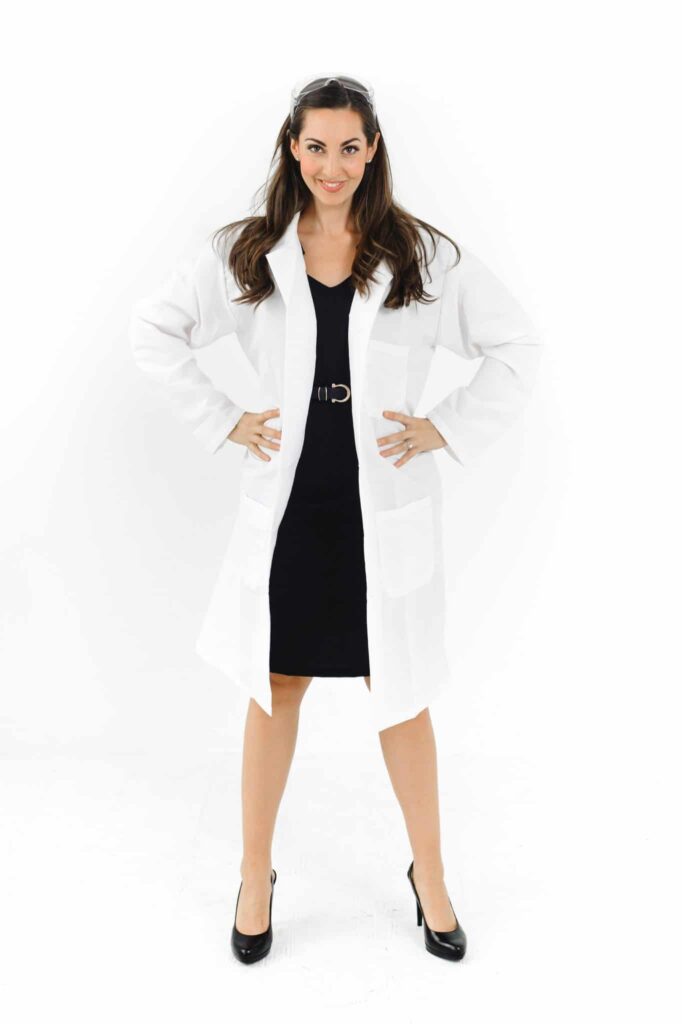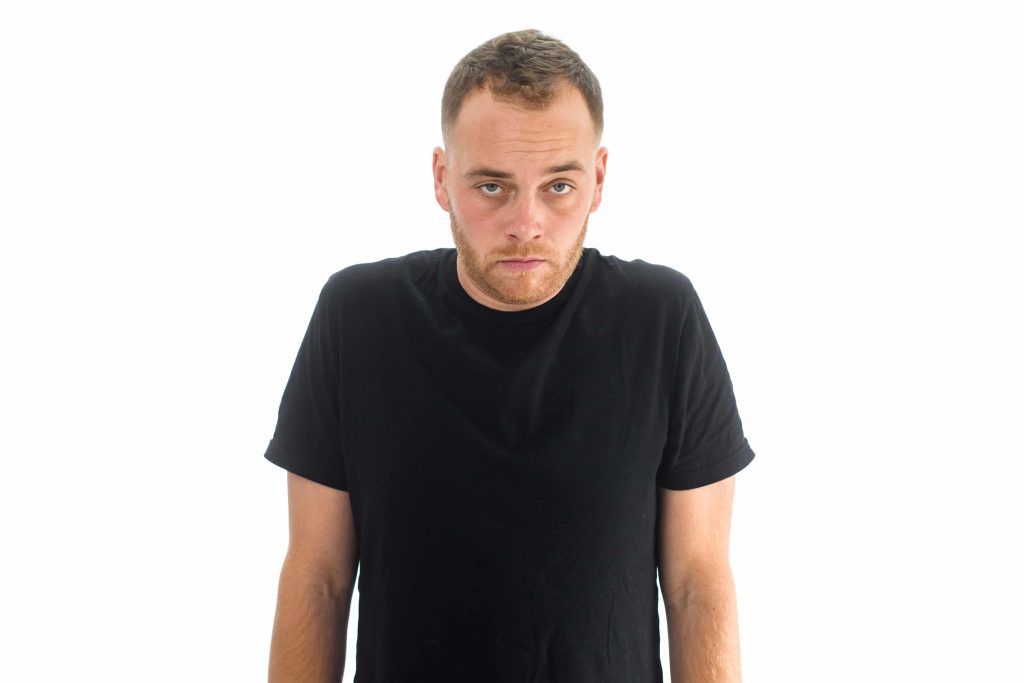This article is part of our body language guide. Click here for more.
Did you know that the shoulder is the most mobile joint in our body? We can move it up and down and rotate it all around. The shoulders’ complex movements also make it a hotspot for body language reading.
Here’s what you’ll learn in this article:
- one of the most irresistible attraction cues to woo any man
- how to tell if someone is telling the truth (or just acting)
- how to get a car salesman to lower the price
- why looking at your phone can cause depression (and how to fix it)

Can You Read Body Language?
How good are your body language skills? Take our free body language quiz to find out!

5 Positive Shoulder Body Language Gestures to Look For
Attraction shoulder
How do you become an expert seduction spotter? Hint: women send out LOADS of playful signals… here’s one of my favorites involving the shoulders. The attraction shoulder happens when a woman slowly raises her shoulder and tilts her head down toward you.
What It Means: Have you ever gotten a flirty shoulder raise? You may be the center of someone’s desires. Watch for the direct eye contact.
If it’s powerful and coupled with a smile, you’ve got the green light to approach. You may even see the seductive sideways glance1https://www.amazon.com/Definitive-Book-Body-Language-attitudes/dp/1409168506.
It’s a very innocent gesture, usually made by women, that signals flirtatiousness and even playfulness–especially if the eyebrows are raised as well.
Why are shoulders so darn sexy? It turns out a raised shoulder actually mimics rounded female breasts1https://www.amazon.com/Definitive-Book-Body-Language-attitudes/dp/1409168506.
Attraction Pro Tip: If you’re a single lady, signal the attraction shoulder and hold your gaze long enough for a man to notice. Smile (and if you’re feeling feisty, throw in a quick lip bite), then quickly look away. There you have it—an ultimate flirtation technique that’s sure to pique interest!
Shoulders back
What It Means: Have you ever been told to sit with your shoulders back and your head up straight? This indicates a strong and confident posture. People in the military have to make sure they always remember this posture to look professional. And you may even be able to spot a veteran as they may continue to keep their shoulders back out of habit, even as a civilian.
I noticed that in business settings a sudden rolling back of the shoulders might mean someone has made up their mind. They might be feeling confident in their decision and it may be hard to sway them, unless you can knock their socks off somehow.
Men also sometimes roll their shoulders back to display their dominance and masculinity. For example, if you ever peoplewatch in public, you might notice a guy roll his shoulders back and stand up straighter as he passes by an attractive woman. But after he passes, he may go straight back into his relaxed position!
Watch our video below to learn how to reinvent yourself with Cues AMA:
Also, have you ever noticed how business suits often have shoulders that are padded? Padded shoulders are there to make wearers look more authoritative and powerful2https://www.amazon.com/What-Every-Body-Saying-Speed-Reading/dp/0061438294, as if the wearer’s shoulders are permanently rolled back.
Pro Tip: How to Look Sexy and Confident
It’s no secret that most power poses involve an expansive posture—this includes rolled back shoulders. But did you also know that broad shoulders are attractive in men? A study3https://link.springer.com/article/10.1007/BF01542671 found that broad shoulders were rated as attractive by both men and women, Make it a conscious habit throughout your day to keep those shoulders back. I find I have an immediate confidence boost with this trick, not to mention it’s great for your posture!
Shoulders going up
What It Means: During a conversation, you might notice someone’s shoulders slightly raising up. This is an easy-to-read body language cue and we can easily see it when a person laughs.
How To Use It: Watch for this cue when you make a joke. It’s my own experience, but people who laugh generally tend to raise their shoulders. This is an easy way to spot fake laughter vs a genuine one.
Rolling shoulders
What It Means: You might see this gesture when someone’s shoulders are tense or stiff from stress. Look for this cue during rush hour—you may spot office workers winding down after work by rolling their shoulders.
On the other hand, this might be an aggressive cue. Angry or competitive individuals might use this as a “battle ready” gesture when they are about to perform or take on a challenge.
The quick shoulder shrug
The quick shoulder shrug is a fast up-and-down motion. It is gravity-defying and signals that someone doesn’t really know. You may see the quick shoulder shrug from kids. And if you ask your coworker if they stole your sandwich from the fridge and you get a quick shoulder shrug? Chances are they may actually be telling the truth.
This gesture could indicate positive feelings since it is typically more honest than a slow shrug (more on that next)2https://www.amazon.com/What-Every-Body-Saying-Speed-Reading/dp/0061438294.
Pro Tip: Watch for Shoulder Height
Pay attention to how high the shoulders raise during the shrug. This can give you an indicator in how confident they feel about their answer2https://www.amazon.com/What-Every-Body-Saying-Speed-Reading/dp/0061438294.

5 Negative Shoulder Body Language Gestures to Look For
The shoulder shrug
What It Means: There are 2 variations of the shoulder shrug:
- The full shrug. This is when both shoulders go up, stay for a second or two, and drop back down. The full shrug typically means a person doesn’t understand something.
- The half shrug. This is when only one shoulder goes up, while the other is relaxed. The half shrug is performed when someone is generally not committed to what they said. This is a gesture I commonly see when I ask people how confident they feel before taking People School (I haven’t seen a single student give a half shrug after taking the course—coincidence? I think not!).
Generally, you’ll find the shoulder shrug used in a cluster1https://www.amazon.com/Definitive-Book-Body-Language-attitudes/dp/1409168506.
- Exposed palms show you have nothing to conceal
- Hunched shoulders indicate protecting the throat from an attack
- A raised brow is used to show submissiveness
The shrug occurs most often at the beginning of the speaker’s turn4https://www.amazon.com/Nonverbal-Communication-Human-Interaction-Knapp/dp/1133311598. Raising one’s shoulder can also indicate insecurity or doubt when a question is involved. Take negotiation as an example:
How to Get the Lowest Price at the Car Dealership
Want to know how I scored an amazing price on my new minivan? I spotted the shrug. Here’s how to do it: if you’re car shopping and you ask the salesman, “Is that your best price?” look for the half shrug. You can interpret this to mean that they feel a lack of full commitment to what is being said—in other words, there is room for more negotiation. This was how I successfully managed to shave off $3000 from the asking price. Woo-hoo!
Shoulders turned away
What It Means: The shoulder turn is a gesture that signals disinterest. Look for it clustered with a torso rotation (usually towards the exit).
Pro Tip: How to Become Better at Sales
Sales are everything. In life, you are selling your skills, your personality, and yourself. And if you’re on the selling side, you’ve got to pay attention to your _target. The shoulder turn is a great cue to look for. It can be very subtle, but it may mean they are ready to ditch your pitch. Catch them before it’s too late—this can make or break your pitch.
Shoulder rubbing
What It Means: Shoulder rubbing can be repetitive may indicate a strong desire to relieve stress. The rub is usually formed by massaging the opposite clavicle (i.e., right hand on left side clavicle) to form and soothe a protective barrier. The shoulder and clavicle area is an erogenous zone because it is sensitive to touch.
One time during an interview, I asked an applicant why he left his previous job. He took a moment to reach across his chest and press his hand against his opposite shoulder, slowly moving across his clavicle and towards his chest. He was clearly stressed and uncertain about his answer, and he later admitted he was having issues with his family life.

Hunched shoulders
What It Means: The shoulder hunch is a naturally slow “drop” of the shoulders. It may even be more permanent in people over time, such as when looking down at a phone. In fact, looking down at the phone is a more naturally defensive posture (most people don’t even realize it!).
Pro Tip: Hold Your Phone Like a Pro
When you’re sitting down and looking at your phone, cross your non-dominant arm over your midsection and prop your dominant arm’s elbow up while holding your phone. The leverage lets you put your phone at head height, avoiding hunched shoulders!
Forward shoulders can also indicate someone is trying to hide something or feels vulnerable, since their neck and chest areas are closed off. You might notice that slumped shoulders are also characteristic of people with depression2https://www.amazon.com/What-Every-Body-Saying-Speed-Reading/dp/0061438294.
There’s also a term called “chronic submission.” This is when a long-term loser or social failure with depression walks with a permanent stoop. You might also see that their shoulders are rounded and their neck is hunched forward5https://www.amazon.com/Peoplewatching-Desmond-Morris-Guide-Language/dp/0099429780.
Bonus #10: More Cues of Attraction
Want to dive in deep on more cues that make up attraction? Take a look at some of our attraction articles:
- how to instantly tell someone likes you
- how to appear more attractive
- the attraction body language of women
Got a Cold Shoulder?
Don’t worry! Warm yourself up with more body language articles from our ultimate guide:
…And while you’re at it, what did you think about this article? Are there any other shoulder gestures you noticed? Let me know in the comments below!
Crack The Code on Facial Expressions
The human face is constantly sending signals, and we use it to understand the person’s intentions when we speak to them.
In Decode, we dive deep into these microexpressions to teach you how to instantly pick up on them and understand the meaning behind what is said to you.
Learn how to decode emotions in our advanced communication course, People School.
Side Note: As much as possible we tried to use academic research or expert opinion for this master body language guide. Occasionally, when we could not find research we include anecdotes that are helpful. As more research comes out on nonverbal behavior we will be sure to add it!
This article is part of our body language guide. Click here for more.
Article sources
- https://www.amazon.com/Definitive-Book-Body-Language-attitudes/dp/1409168506
- https://www.amazon.com/What-Every-Body-Saying-Speed-Reading/dp/0061438294
- https://link.springer.com/article/10.1007/BF01542671
- https://www.amazon.com/Nonverbal-Communication-Human-Interaction-Knapp/dp/1133311598
- https://www.amazon.com/Peoplewatching-Desmond-Morris-Guide-Language/dp/0099429780
How to Deal with Difficult People at Work
Do you have a difficult boss? Colleague? Client? Learn how to transform your difficult relationship.
I’ll show you my science-based approach to building a strong, productive relationship with even the most difficult people.

